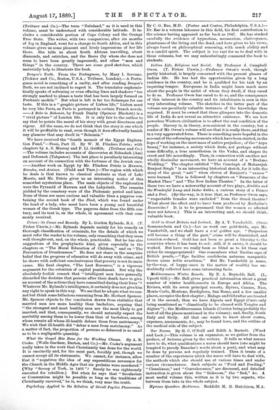Indian Life, Religious and Social. By Professor J. Campbell Owen.
(T. Fisher Unwin.)—Professor Owen's work, though partly historical, is largely concerned with the present phases of Indian life. He has had the opportunities given by a long residence in the country, and he is qualified for his task by an inquiring temper. Europeans in India might learn much more about the people in the midst of whom they dwell, if they cared to do so. Professor Owen has cared to do so, and the consequence of this interest in the country and its inhabitants is seen in this very interesting volume. The sketches in the latter part of the volume are peculiarly valuable instances of the knowledge thus acquired. It must be owned that these glimpses into the domestic life of India do not reveal an attractive existence. We see how powerless Western civilisation is to affect the real condition of the people. Slavery is, in theory, non-existent in the country, but a reader of Mr. Owen's volume will see that it is really there, and that in a very aggravated form. There is something more hopeful in the account of the reforming movements which have been started, in the hope of working on the inert mass of native prejudice ; of the "Arya Samaj," for instance, a society which finds, not perhaps without some difficulty, a true monotheism in the Vedas, and shapes its creed and life accordingly. Then, in connection with another not wholly dissimilar movement, we have an account of a " Brehm° Wedding." The chapter entitled "The Cenotaph of Maharajah Runjeet Singh" is an interesting historical sketch, for it tells the story of the great " sati " when eleven of Runjeet's " ranees " were burned. This is followed by chapters on " Rumours of the Market Place" and "The New Indian Theatre." In the latter of these two we have a noteworthy account of two plays, Aladdin and the Wonderful Lamp and Indur Sabha, a curious story of a Prince and a Peri. (By-the-way, is it true that, as Professor Owen says, " respectable females were excluded " from the Greek theatre ? What about the effect said to have been produced by Asehylus's Eumenides? It is to be presumed that the women so affected were not hetara.) This is an interesting and, we should think, valuable book.


































 Previous page
Previous page